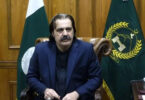Hina Khattak
National Finance Commission (NFC) Award is formed to distribute the financial resources between the federal government and provincial governments. The taxes collected from the provinces form a divisible pool. This pool includes income tax, sales tax, capital gain tax, wealth tax, and customs duties tax. The distribution of revenues between the federation and provinces is governed by Part VI of Chapter 1 of the constitution of Pakistan.
According to Article 160, the President shall constitute a National Finance Commission consisting of the Minister of Finance of the Federal Government, the Ministers of Finance of the Provincial Governments, and such other persons as may be appointed by the President after consultation with the Governors of the Provinces. The first six NFC awards were exclusively population-driven.
The resources were distributed purely on provincial needs as evinced by the size of their population. The larger the population of a province the higher its share. With the biggest population, Punjab continued to enjoy a resource share ranging between 57.88% and 60.27% during 1974-2006. On the other hand, Balochistan, with the smallest population, received the smallest share of resources at a minimum of 3.8% and a maximum of 5.30%.
After a consensus was formed in 2010, a new resource-sharing formula was formally applied in the 7th NFC Award. This Award made significant changes in the design of the resource distribution mechanism. It introduced multiple indicators for the horizontal distribution of the resources. According to the formula, the population was given a weightage of 82% while the rest of the 18% points were distributed among backwardness/poverty (10.3%), inverse population density (2.7%), and tax revenue/generation (5%). But, contrary to popular belief, the 7th NFC Award did not offer a progressive, equitable and efficiency-based formula.
The NFC’s focus on population as the main determinant of resource distribution thwarts its original objective of addressing the country’s socio-economic needs. Other factors like an outdated census, the KP-FATA merger under the 25th amendment, and the undocumented migrants make the weightage on population quite deteriorating. Despite a rising imbalance in the economic and demographic outlook of various provinces, there has been no progress in the distribution of federal resources. The future NFC awards include a gradual shift from a population-based distribution of resources to an efficiency-seeking sustainable sharing of resources.
For the sustainability of the NFC award, three things should be considered i.e. social progress, economic development, and the environment. For a sustainable formula to work for Pakistan, equity should be the base of the formula. As the prior awards were mainly population-driven, they deprived other provinces of their just share in the resources. This inequity in the distribution of resources created a development gap among the provinces. With the existing social and economic inequality, the surge in terrorism and recurring climate change disasters coerce the formation of a sustainable formula for the just horizontal distribution of resources.
The National Finance Commission holds a lot of political influence. The first step towards the sustainability of the NFC awards is the shift of NFC from a political body to a technical body. With experts from the fields of Finance, accounting, economics, law, social protection, climate change, and sustainable development, it should be transformed into a practical body. The experts will scientifically analyze the present needs of the provinces while taking care of the needs of the upcoming generations. Its decisions should not necessarily be consensus-based but research-based. As some experts and academics have already argued, the mechanisms exclusively based on consensus always suffer from inertia.
The existing parameters do not guarantee the just distribution of resources and sustainable development of the country. The 15th Finance Commission of India provides a better picture of a sustainable formula for the distribution of resources. It gives a weight of only 15% to the population and includes other important indicators as determinants of the devolution of resources like area 15%, income distance 45%, demographic performance 12.5%, tax effort 2.5%, and forest and ecology 10%. It addresses the issues of climate change by allotting 10% to the forest and ecology.
Pakistan presently faces serious development challenges due to the worsening state of the environment, increasing pressure on natural resources, and climate change. As per the Global Climate Risk Index, Pakistan ranks 5th most vulnerable country to the impacts of climate change.
However, climate change affects each province quite differently due to factors like topography, infrastructure, and the level of development of that province. Rural Sindh, Balochistan, and KP are more vulnerable to climate change with limited resources for environmental rehabilitation. For this reason, NFC should address the issue through sustainable financing of Climate Change.
The UNDP Global Human Development Report 2022 shows Pakistan’s Human Development Index (HDI) ranks at the 161st place globally. The World Economic Forum’s 2022 Global Gender Gap Index places Pakistan at 145th out of 146 countries.
These alarming indicators mirror the miserable state of social development in the country. Southern KP, Balochistan and Rural Sindh are the most backward areas of the country which require adequate funding for the upheaval of the social development sector.
Time is an essential dimension of sustainability. If we do not understand the meaning of being sustainable today, then tomorrow will be too late. By acknowledging the suggestions mentioned above, we will equitably meet the present’s basic needs without compromising on future generations’ capacity to meet their own needs. By working towards social progress, equitable economic development, and environmental protection, we will lay the foundation for a peaceful and prosperous state.







